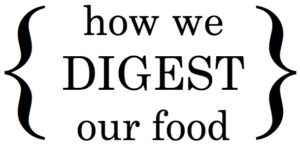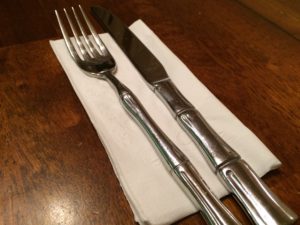It’s Also About How We Eat, Not Just What We Eat

Fast food. Drive through. Eat on the go.
Americans don’t often take the time to stop and eat.
While multitasking during meals may save us a few minutes here and there, we may be paying for the time savings elsewhere. And boy is it costly.
Our digestive system does its job more fully when we take our time and relax while we eat. If we rush to eat, don’t thoroughly chew our food, or eat while we are stressed out, we interrupt what our body is inherently trying to do: absorb the nutrients provided by our food. Stress before, during, and after meals can cause the stomach to stop churning and mashing up food. Meanwhile, stress additionally signals our nervous system to decrease and even stop releasing stomach acid and digestive enzymes. Meaning we can’t break our food into smaller pieces so that our body can actually absorb the nutrients from it. Opportunity wasted. 🙁
Here are some tips to get the most out of your food and get into a more health-supportive routine.
Rest and digest. Attempt to minimize stress 30 minutes before, during, and 30 minutes after meals. Make meal prep and table set up as stress-free as possible. Reheat food prepared in advance or have a well-stocked pantry of easy-to-assemble items in order to avoid a last-minute scramble to the tune of a whiny hangry toddler. After eating, sit upright or do quiet activities to allow your body to divert all its energy to digestion.
Make the time to eat. Allow yourself at least 15 minutes, but ideally more. The French often set aside at least one if not two hours for dinner. On a week night!
Eat slowly. Stretch out bites so that the food on your plate lasts at least 15, if not 30 minutes. And chew each bite close to 30 times, just like grandma used to do. (She was always the last one to put her fork down, and for good reason.) This can take practice if you’re an Olympic speed eater, but your stomach will thank you.
Create space, physically and mentally, to eat. Sitting at a table with a knife and fork separates eating from any other task you will complete during the day, allowing you to focus on your food rather than on driving the carpool. Or working at a desk. Or folding the laundry.
Environment matters. Soft music, flowers or candles decorating the table, the sound of a waterfall, all can induce relaxation, and therefore, improve digestion.
Make meals social. Approach mealtime as a place to connect with family or friends, or to pause during your day. Skip the screens to further disconnect from overstimulating technology and engage in meaningful relationships. Pleasant conversation and laughter relax us, allowing our bodies to digest and absorb nutrients properly.
Speaking of pleasant conversation…conversation topic matters, too. Hot-button topics, such as politics or how much of the jerk the boss is, can trigger stress. Bring on the acid reflux!

Take small bites. Instead of pretending that your fork is a spoon (those spork things were really a bad idea), stab a piece of food instead. The quantity you’re aiming for is the amount you can swallow at once after thoroughly chewing. If you notice you swallow multiple times per “bite” of food, try putting less in your mouth.
Figure out what your family needs to have on the table before everyone sits down so you can focus on eating, not fetching. It’s everyone’s responsibility to help determine this ahead of time. Water pitcher? Hot sauce? Salt and pepper? Bread knife? Napkins? Make a check list if necessary as you get into the routine.
Consume less liquids with meals. Don’t suffer with a dry mouth, but don’t guzzle your entire morning’s worth of water during lunch, either. Excess liquid dilutes stomach acid, which you need to digest proteins. Sip throughout the day instead.
Express gratitude for the meal before you. It only takes a moment, but can separate the meal from the rest of your busy day and make it more meaningful.
Start a mindfulness practice while you eat. Observe the colors on the plate, the aroma wafting into your nose, the delicate flavors on your tongue, the textures in your mouth, how it feels to swallow, the gratitude you have for having nourishing food in front of you.
Bon appétit et bonne digestion!

1 thought on “It’s Also About How We Eat, Not Just What We Eat”